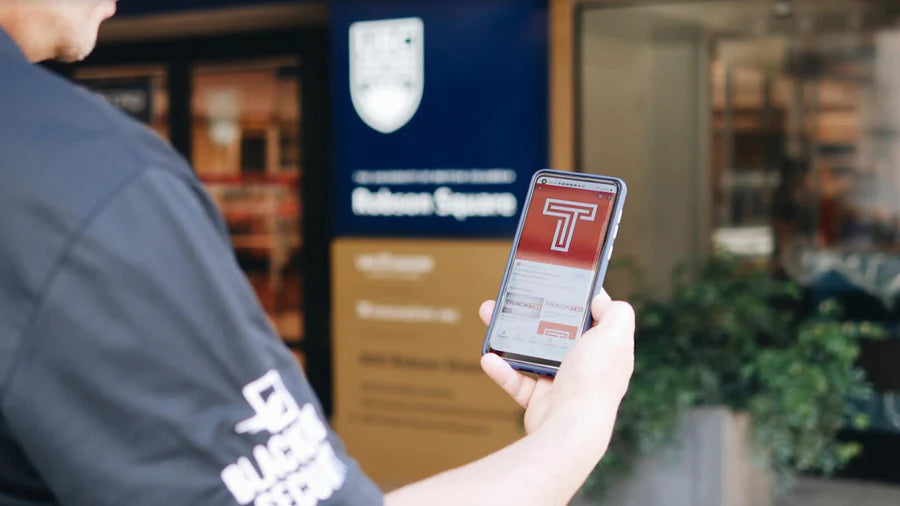Blackbird Academy: Use of Force Training for Security Guards
Training is the foundation of quality security services, and we at Blackbird Security take pride in our extensive in-house training program provided through Blackbird Academy. In this blog, we’ll outline our in-person Use of Force training program provided by Amir Anvarizadeh, Training & Development Manager at Blackbird Security.

What is the Use of Force, and Why is it Necessary for Security?
The use of force in security involves employing techniques necessary to safely apprehend and manage individuals who have committed crimes on protected property. However, it extends far beyond physical intervention. At Blackbird Security, we emphasize that the use of force encompasses a broader skill set, including non-verbal communication and de-escalation tactics, which are critical components of our comprehensive training approach.
Our Use of Force program at Blackbird Security is designed to prepare participants for real-world scenarios by addressing more than just physical restraint techniques. The curriculum integrates practical, scenario-based training that simulates real-life situations, such as dealing with assaultive behaviour or managing tense verbal confrontations. This approach ensures that participants not only learn to apply mechanical restraints but also develop the judgment and skills needed to navigate complex incidents effectively.
We are committed to ensuring our staff are equipped with the knowledge, skills, and confidence to handle any situation with professionalism and respect while prioritizing safety for all parties involved.
Undergoing Use of Force training is a requirement for our Tactical Unit at Blackbird Security. Tactical security guards are typically deployed to high-intensity areas, such as stores in high-crime rate neighbourhoods, to provide physical protection to customers and staff when necessary.
As part of their duties, security guards may encounter situations where a suspect poses a physical threat to them or those around them. These situations can include physical assaults on the guard or on other individuals. In such cases, the use of force must be carefully applied as a method of self-defense, defense of others, apprehension, physical removal, or the protection of property.
Security guards must understand how to use force judiciously and in compliance with the Criminal Code of Canada, ensuring it is both justified and appropriate for their safety and the safety of others.
Key Use of Force Course Topics
Our Use of Force training program is divided into two key sections: Legal and Use of Force Training. Here’s a brief outline:
Legal:
-
Use of Force Model (Updated version: Public-Police Interactions Training Aid Framework)
-
Criminal Code of Canada
-
Trespass to Property Act
-
Verbal Judo
-
De-Escalation
-
Arrest Power (Federal and Provincial)
-
Canadian Charter of Rights and Freedoms
Use of Force Training:
-
Standing
-
Handcuffing
-
Escorting
-
Difficult Subject (passive/active/assaultive)
-
Search
-
Baton
-
Scenario Based
-
Review CCTV Footage
The legal and training sections of the course are equally critical for establishing rules and guidelines on the use of force. They teach security guards when and how to use force appropriately, ensuring compliance with the Criminal Code of Canada and respect for the rights of citizens as outlined in the Canadian Charter of Rights and Freedoms.

Training in Canadian Law
We teach our Use of Force course with a foundation in Canadian law. During the course, our security guards learn about Canadian criminal law and the Canadian Charter of Rights and Freedoms. They are trained to make careful, thoughtful, and judicious decisions when using force and apprehending suspects who have committed a crime on safeguarded property in strict compliance with the law, including when they are legally allowed to make an arrest and when they are not.
According to the Canadian Criminal Code, c. C-24 s. 26, “Every one who is authorized by law to use force is criminally responsible for any excess thereof according to the nature and quality of the act that constitutes the excess.” This provides a framework of accountability for security guards to operate within, preventing the use of excessive force and ensuring everyone’s safety—including the safety of potential suspects.
In our training sessions, participants not only learn how to apply force effectively but also how to articulate their actions in incident reports. This includes detailing the justification for using force and ensuring their reports align with legal requirements. Additionally, in provinces where applicable, participants are trained on how to complete Use of Force forms in accordance with provincial laws. This comprehensive approach equips security professionals with the knowledge and skills to act responsibly, legally, and confidently in high-pressure situations.
Hands Off: A Culture of De-Escalation
The primary goal when using force against an individual is to protect safety. “We promote a strong culture of de-escalation and foster a commitment to the ethics of duty, upholding professionalism and ensuring the protection of the Charter of Rights and Freedoms,” says Amir.
Prioritizing de-escalation is critical for maintaining safety, even if post orders or standard operating procedures (SOPs) permit a hands-on approach. Our Use of Force training program emphasizes a strict hands-off policy specifically designed for clients who require such an approach. This policy ensures security guards are not personally or directly involved with customers or merchandise, in alignment with Sections 8 and 9 of the Canadian Charter of Rights and Freedoms, which protect individuals from unreasonable search and arbitrary detention. The policy strictly prohibits touching suspects or merchandise and searching bags or belongings. While these actions are becoming more common in the industry, they infringe on the fundamental rights of citizens. We ensure that our guards clearly understand the distinction between detaining and apprehending individuals. In general, a hands-on approach should only be used in emergencies, such as when security guards must act in self-defence or in the defense of others.
Verbal Judo and Effective Communication in Security
Our security guards learn the skills and techniques required to de-escalate situations verbally. They may encounter individuals who attempt to push boundaries set by their clients, in which case they will employ active listening, empathy, clarification questions, and other techniques to ensure the individual feels understood. These techniques are proven to de-escalate situations and diffuse tensions. We not only utilize Dr. Thompson’s LEAPS method but also incorporate all the key concepts and techniques he outlined in his book, The Gentle Art of Persuasion.

Use of Force Physical Training
Our security guards—both uniform and undercover—learn physical techniques in person at the Blackbird Security office. Led by Amir, they learn key information about standing posture, handcuffing, escorting, searching, self-defence, baton use, and ground defence. After Amir demonstrates each technique, participants practice during the lesson and receive feedback on their execution.
Security guards are taught important guidelines, rules, and steps to follow when implementing physical techniques. These rules serve two purposes: to execute the techniques as safely as possible while minimizing injuries and preventing subjects from fleeing the scene and to prevent any complaints or Charter violations.
At the end of the Use of Force course, Amir walks participants through real-world scenarios, including aggressive subjects during recovery incidents, intoxication, presence of weapons, and more. Security guards may realistically encounter these situations in the field—classroom preparation ensures guards are ready for the real scenario.
A unique aspect of our program is the review and analysis of real-world situations captured on our CCTV footage. By examining these archives, participants gain valuable insights into the dynamics of security incidents, enabling them to better understand and anticipate challenges they may face in the field.
Partner With Canada’s Number One Security Company
At Blackbird Security, our Use of Force training program exemplifies our commitment to providing the highest standard of security services. With guidance from Amir, our security guards exit the course prepared to handle complex security situations safely and professionally. Get in touch with us using the form below to learn how our well-trained security teams can protect your business.








